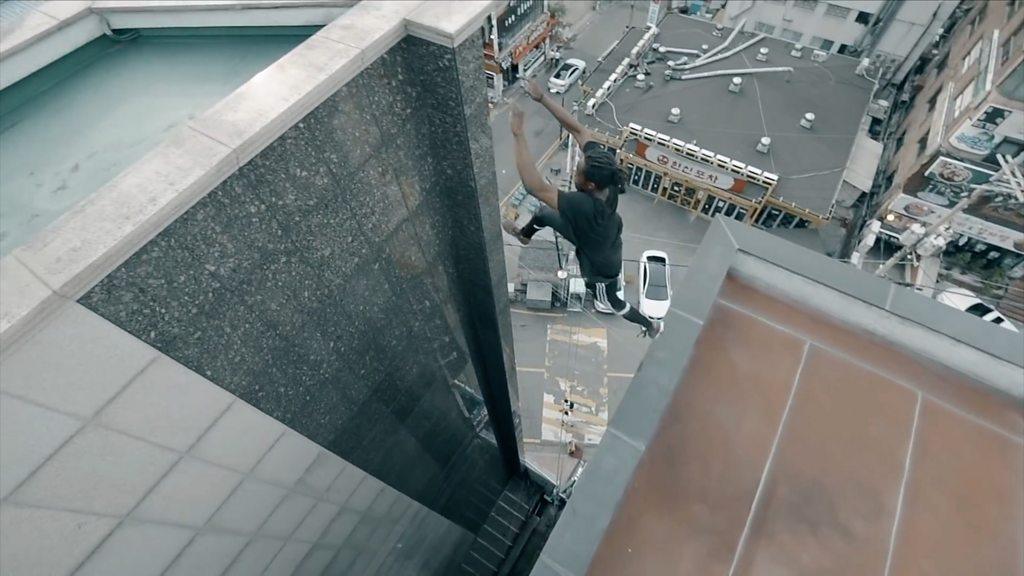Randy Rainbow made his name satirising Trump - now what?
- Published
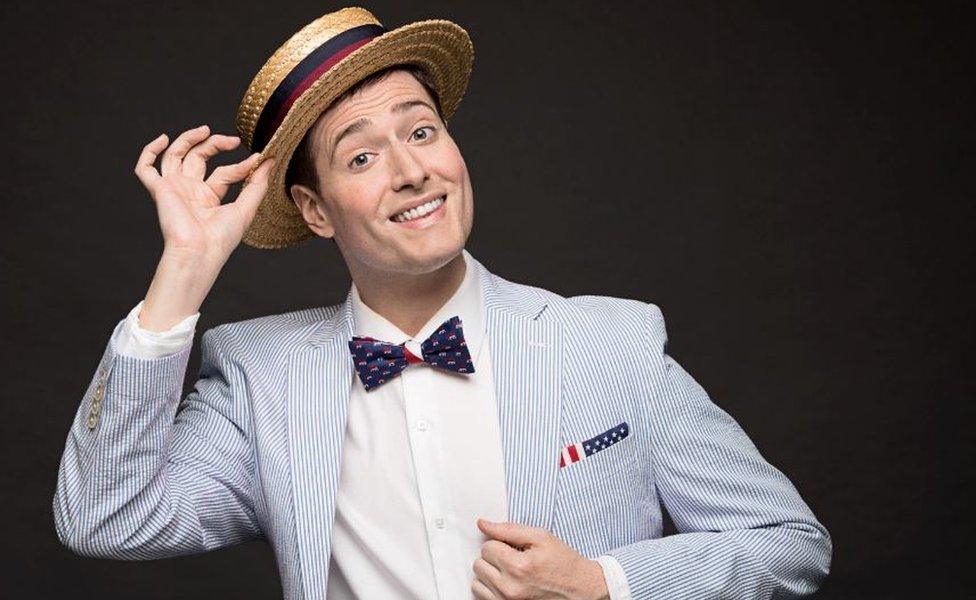
Randy Rainbow adapts well-known show tunes for his videos
Those with cause to lament Donald Trump's departure from the White House may include America's satirists - the people he gave comic material to almost daily. In those four years the videos of Randy Rainbow delighted countless followers with satire chiefly using the improbable medium of Broadway show tunes. But the curtain's not down yet.
Randy Rainbow - it's his real name - grew up outside New York City and at 10 moved with his family to south Florida. Returning to New York at 22 he was intent on a performing career.
"But I knew I was a pretty young 22," he recalls. "I'd been on stage as a kid and I thought I just had to grow into myself as a person before I began a career for real. To fill in I did jobs such as working in restaurants and behind the desk at production offices."
To fend off boredom he started writing a blog which picked up on trends in popular culture and especially in musical comedy. "That led me to YouTube and once I had some eyeballs on me I got a job providing content for the BroadwayWorld website," he says.
For a time he was doing two separate things online. "There was my non-musical stuff which, so to speak, Forrest Gumped me into the hot topics in mainstream media. The first video which really went viral was in 2010: I was on the phone in my apartment pretending to date a ranting Mel Gibson.
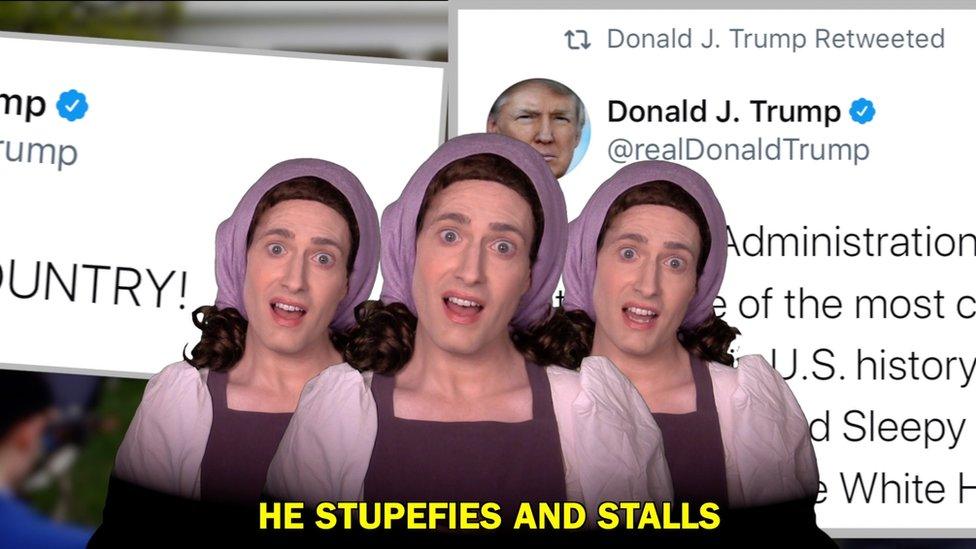
Fiddler on the Roof's music has inspired some of Rainbow's videos
"Whereas BroadwayWorld wanted material based on what was going on in theatre. So I started writing and performing parodies of show tunes and over the years it all just merged into one.
"Eventually I was doing parody songs on YouTube about whatever was happening in the US. And of course from 2017 that mainly meant satirising Trump - though initially I had no idea how much work it would all mean."
His recent video Sedition, external has already had more than two million hits. It's based on Tradition, the opening number of the classic musical Fiddler on the Roof.
Warning: Some of the language in this video may be considered offensive.
Allow YouTube content?
This article contains content provided by Google YouTube. We ask for your permission before anything is loaded, as they may be using cookies and other technologies. You may want to read Google’s cookie policy, external and privacy policy, external before accepting. To view this content choose ‘accept and continue’.

Among other hits have been Kamala!, external, based on Camelot, and a version of the West Side Story song Gee Officer Krupke reworked as a love letter to Dr Anthony Fauci.
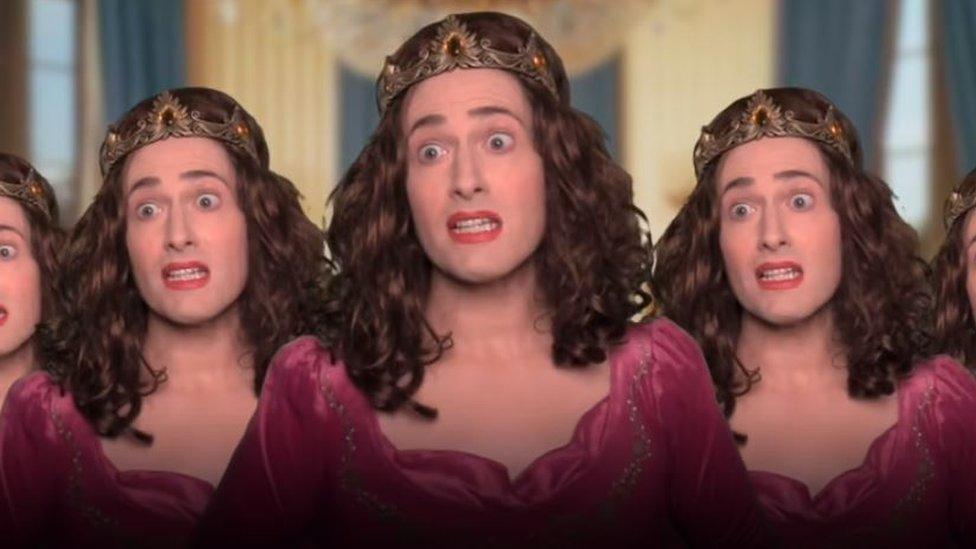
The musical Camelot was used for Rainbow's video about Kamala Harris
Rainbow has a fascination for even obscure Broadway and Hollywood songs: The Bunker Boy is a clever rewriting of The Jitterbug, an Arlen & Harburg number dropped from The Wizard of Oz.
Usually Rainbow has been posting a couple of videos each month. For a one-man band working from the spare bedroom of his New York apartment they're made to an impressive standard. Growing financial success has meant he's been able to move from the outer borough of Queens to Manhattan's Upper West Side.
Yet he insists his technical skills remain under-developed. "Basically I'm a ham and my roots are totally in performance. In anything else I'm winging it: I don't know what the hell I'm doing.
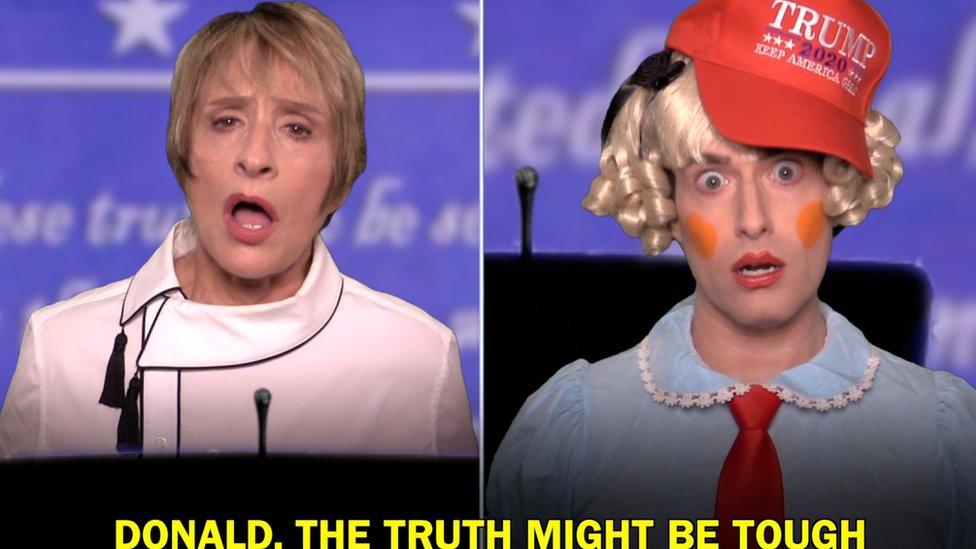
Randy Rainbow has had to teach himself the technical skills to make his videos
"I've taught myself just enough of Final Cut and Adobe After Effects to put all this together. My overhead is small - the expense is mainly for certain videos when I need to buy costumes or maybe props. But it varies - you can get a cheap wig these days for $4.95."
Rainbow films his own contributions on green screen and the music he uses comes from karaoke download sites. Copyright problems are none as US law protects the concept of musical parody.
Luminaries of the theatre who have let Rainbow know how much they approve of his lyrical and musical meddling include Stephen Sondheim, Andrew Lloyd Webber and Lin-Manuel Miranda.
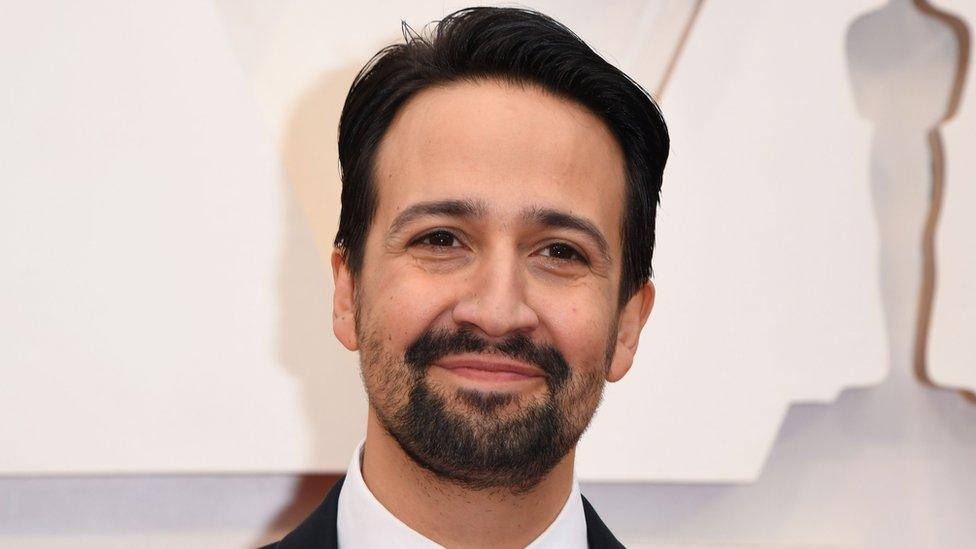
Acclaimed show creator and actor Lin-Manuel Miranda is among those who have praised Rainbow
Rainbow says he needs to produce each video inside 72 hours at most and if possible within 48 hours. "It's because the news cycle has now become so crazy in America that there's always a danger you could start something that will feel out of date before anyone sees it."
Fairly obviously Rainbow is no Trump fan. But he says his own followers are not exclusively of the Democrat-supporting liberal elite the former president was critical of.
"He has devoted supporters and admirers who nonetheless aren't blind to his foibles. I was told by whistle-blowers there were White House people who enjoyed my work. Maybe they were talking about Melania.
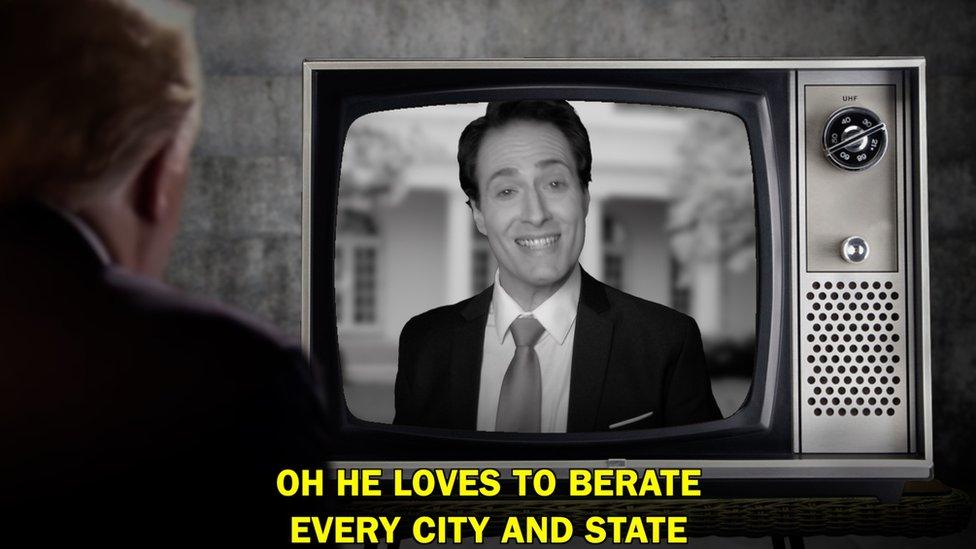
"I think at one point her husband did have a sense of humour but I very much doubt now he would take an interest. And he never blocked me on Twitter which I'm very upset about."
Isn't Rainbow worried he's about to have very little left to satirise?
"It's true I don't anticipate Joe Biden being the same endless source of comedy material. The kind of satire I do is always better when there's a great central subject - just like storytelling is enriched by a really juicy villain. But the joke had expired on Trump."
Rainbow's final video of the Trump era may have been his least amusing. Perhaps that was the point.
Seasons of Trump, posted in the dying hours of the presidency, is based on Seasons Of Love from the musical Rent. It's without comic one-liners and the basic tone is of anger and regret.
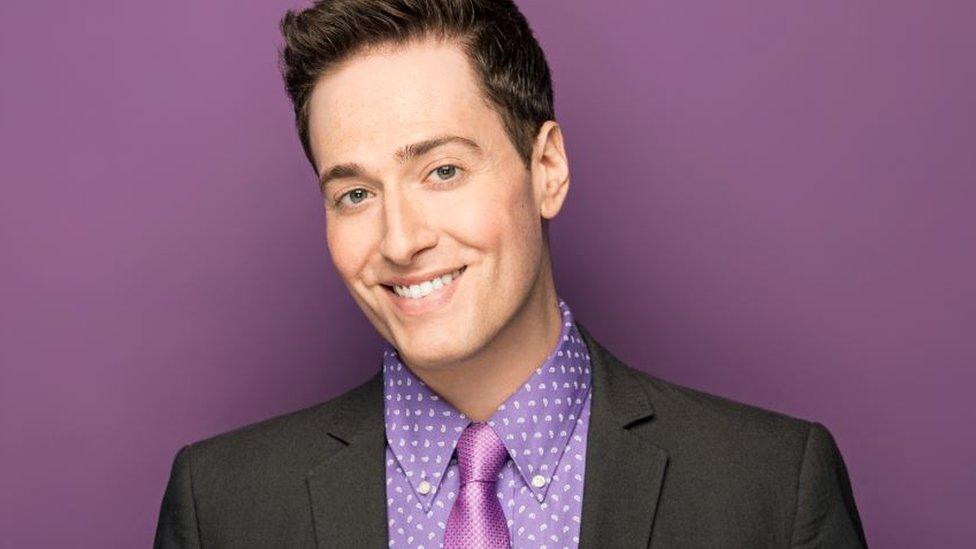
Randy Rainbow believes there will always be ample material for topical humour such as his
"The truth is it had been getting trickier for me to make the jokes," he says. "There was a time when the job was a lot more fun. I'm ready to be done with it all because it's become so dark, what's going on in the world."
Rainbow has recorded an album of Christmas classics and he's currently writing his first book. But he doesn't anticipate an immediate end to life as an online satirist.
"Topical humour, by its nature, is an endless well of material. In these times of social media people are always up in arms and debating something. You're looking for the thing everyone is talking about and really I've just been following the bouncing ball."
Rainbow says his job isn't necessarily to spoof whoever's in, or has been in, the Oval Office - although he may still do Trump videos if he's making the news. He points out that in 2020 his output wasn't all Trump anyway - the subject was often Covid-19.
"It just so happens that for four years almost all the heat in comedy came from one source. But that's not how humour is meant to be. Or how America is meant to be."
- Published21 November 2020
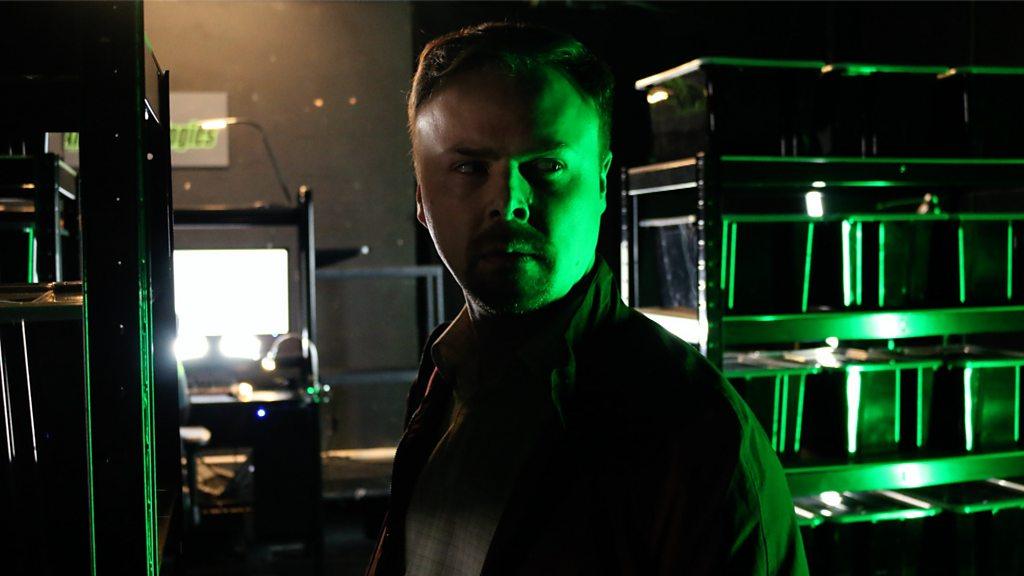
- Published16 October 2020
